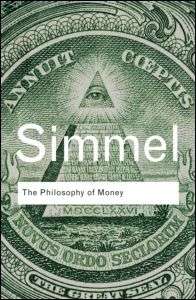The Philosphy of Money

Editorial Routledge
Colección Routledge Classics, Número 0
Fecha de edición abril 2011
Idioma español
EAN 9780415610117
596 páginas
Libro
encuadernado en tapa blanda
Resumen del libro
With a new foreword by Charles Lemert
'Its greatness lies in ceaseless and varied use of the money form to unearth and conceptually reveal incommensurabilities of all kinds, in social reality fully as much as in thought itself.' - Fredric Jameson
In The Philosophy of Money, Georg Simmel puts money on the couch. He provides us with a classic analysis of the social, psychological and philosophical aspects of the money economy, full of brilliant insights into the forms that social relationships take. He analyzes the relationships of money to exchange, human personality, the position of women, and individual freedom. Simmel also offers us prophetic insights into the consequences of the modern money economy and the division of labour, in particular the processes of alienation and reification in work and urban life.
An immense and profound piece of work it demands to be read today and for years to come as a stunning account of the meaning, use and culture of money.
Georg Simmel (1858-1918) was born in Berlin, the youngest of seven children. He studied philosophy and history at the University of Berlin and was one of the first generation of great German sociologists that included Max Weber.
Biografía del autor
Georg Simmel (Berlín, 1858-Estrasburgo, 1918) fue hombre de múltiples saberes, abarcando los campos de la filosofía, la historia, la sociología y las ciencias sociales en general. Filósofo no sistemático, su postura representa una especie de neo-kantismo relativista, de raíz vitalista, que tuvo un amplio predicamento en la Europa de final del siglo xix y principios del XX. Fue amigo de escritores como Rainer Maria Rilke y Stephan George, y también de filósofos como Max Weber, Edmund Husserl y Ortega y Gasset, de quien fue profesor durante la estancia de éste en Alemania. Entre sus obras, destacan Schopenhauer y Nietzsche, Problemas fundamentales de la Filosofía y Diagnóstico de la tragedia de la cultura moderna, todos publicados en la Biblioteca Filosófica de Espuela de Plata. Tan amplia y variada es su obra, que en realidad no hay dominio sociedad, economía, religión, arte, moda, moral, filosofía que no deba a Simmel la indagación de su perfil huidizo o de su intrincada estructura.








